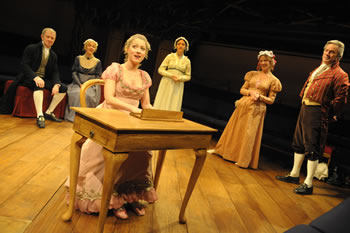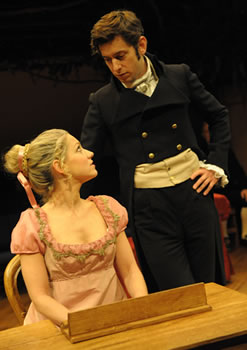Middlemarch - The Doctor’s Story
Liz Vercoe reviews the latest Orange Tree production
Keep your wits about you to get the very best out of this tale of high hopes wrecked by misguided love, says Liz Vercoe.

Dr Sprague (Jamie Newall), Mrs Bulstrode (Liz Crowther),
Rosamond (Niamh Walsh), Mrs Plymdale (Daisy Ashford),
Mrs Vincy (Lucy Tregear), Mr Vincy (Michael Lumsden)
On its romantic, Victorian surface, George Eliot’s novel Middlemarch is about self-sacrifice for love. Most of the couples in it offer different takes on this theme. Which sounds rather simple, lovey dovey stuff. But what if the needs and desires of the person you love are shaped by uglier external pressures: economic, political, social or even criminal? What does that do to your sense of self in supporting them? In asking and answering that question Middlemarch is as relevant today as in 1871.
Currently at The Orange Tree Theatre in Richmond we have The Doctor’s Story, the second part of a The Middlemarch Trilogy that has been crafted from the novel and then directed here by actor/director Geoffrey Beevers, who lives in Richmond.
Not having seen the first part, Dorothea’s Story, which returns in the programme in December, I can vouch that The Doctor’s Story is perfectly enjoyable
as a standalone play. And that trying one does not commit you to the whole set
to the whole set. Equally, it’s a perfectly good place to start if you want to see all three. The third part, Fred and Mary, premieres in December.

Rosamond (Niamh Walsh) and Doctor Lydgate (David Ricardo-Pearce)
Niamh Walsh, a LAMDA graduate of 2012, almost steals this show. She is Rosamond, the daughter of self-made parents who have done their utmost to give their children a leg-up in society by providing them with an education in good manners and behaviour. And so she captures the heart of David Ricardo-Pearce’s doctor, Mr Lydgate.
Walsh’s performance conveys the contradiction of outward sweetness beneath which is such an iron will of self-centredness that it will be the eponymous Doctor’s downfall. Her Rosamond manages to be so innocently unaware of the fact that anyone could see things in life differently to her, that when her soulful eyes brim with shining tears at the loss of some trinket or trifle no one in the audience wants to say “Pull yourself together”. It’s a masterful performance essential to the heart of this play.
In a way, her young doctor husband is equally blind. He assumes he will be king of his progressive-medicine castle and she his fragile butterfly helpmate. But having thought he’d shaken off the dated social expectations of his titled family by studying medicine, he walks straight into a honey trap of different social pressures. His wife wants affluence not intellect.
Lydgate’s struggles ensnare him ever tighter until it is he who is pinned into his place in society like an insect on a collector’s board. Although Ricardo-Pearce’s performance doesn’t quite convey the agony Lydgate must be in, it does capture his essential decentness and lack of political guile.
Another memorable pairing comes from Isleworth born Christopher Ettridge’s banker with secrets Mr Bulstrode and his wife, played by Liz Crowther, also from Isleworth. The scene where he fears losing her love and her moment of forgiveness is wonderfully touching.
Despite consistently fine performances from all these top-class actors, the main difficulty is keeping track of the strands and characters of the play. All the small cast narrate at times from different places on the stage and most play two or more parts. The props (simply a table and a chair) are lugged around so often, to mark the changes of scene from house to house and parlour to parlour in and around the village of Middlemarch, you fear for the casts’ backs. Concentration is required and cosy-theatre nodding off even for a few minutes not recommended.
If you know something of the Middlemarch plotlines, there’s also the temptation to be distracted by spotting the characters in the two other parts of the Trilogy. Entering this part of the story are Dorothea Brooke (played by Georgia Strawson whose performance here is a tempting trailer to the whole of her Dorothea’s Story) and her husbands-to-be Casaubon (Jamie Newall) and principled Ladislaw (Ben Lambert), as well as principled Fred of Fred and Mary (Rosamond’s brother, also played by Ben Lambert who must now be something of an expert in displaying principles…).
The Middlemarch Trilogy runs until February 1, 2014 including Trilogy Days with all three plays performed on one day. Thursday matinee tickets include a post show discussion. The Doctor’s Story runs until November 30 then returns December 19 Fred and Mary starts December 4 Dorothea’s Story returns December 17 |
Liz Vercoe
November 22, 2013
Related links
|